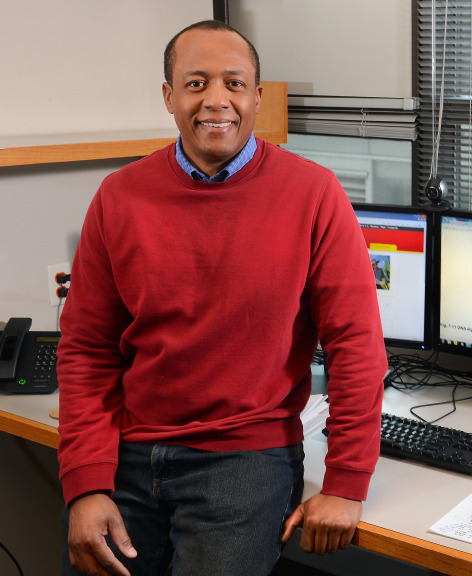
Walter Suza is leading a project that aims to help train a new generation of plant breeders in Africa. Photo by Bob Elbert. Larger image.
AMES, Iowa – Agronomists at Iowa State University are leading an effort to prepare a new generation of plant breeders in Africa who will face the challenge of feeding a growing population.
Walter Suza, an adjunct assistant professor of agronomy, is overseeing the project, which will take advantage of the latest computer technology to design and develop online and electronic educational materials to help faculty at African universities train students who are seeking master’s degrees in plant breeding.
The e-modules developed by the ISU team will be used in plant breeding curricula by faculty at Kwame Nkrumah University of Science and Technology in Ghana, Makerere University in Uganda and the University of KwaZulu-Natal in South Africa.
The e-modules will help train the legions of plant breeders the continent will need in the years ahead while capitalizing on the wealth of plant breeding expertise at Iowa State. Suza said finished e-learning materials will be available to faculty in Africa by the second year of the project.
“The world population is projected to reach 9.6 billion by 2050, and most growth is expected to occur in the developing world, where there are food shortages already,” Suza said. “Committing to the education of plant breeders is a long-term approach to fighting hunger in Africa. This is a sustainable, lifetime solution.”
Suza will lead a team of ISU faculty representing a range of academic disciplines, including agricultural education studies, education, industrial and manufacturing systems engineering and horticulture.
Suza, who grew up in Tanzania and has worked in Angola and Zimbabwe, said he and others working on the project will tailor its content specifically for Africa. That requires understanding the complexities and needs of plant breeders there.
“Corn and soybean, obviously a strength at Iowa State, will be involved, but also crop plants commonly grown in Africa like sweet potatoes, cassava and rice,” he said.
Kendall Lamkey, professor and chair of the ISU Department of Agronomy, said the plant breeding project builds on the strength of existing programs at Iowa State like the master of science in plant breeding and the master of science in agronomy, both of which offer students the flexibility of a first-class education without requiring them to be on-campus full time.
“These are very successful programs and pretty cutting edge in how they use technology to give students a classroom experience at their computer,” Lamkey said. “The plant breeding master of science programs for Africa can build on those strengths.”
He said Suza’s deep understanding of and experience with Africa uniquely qualifies him to take charge of the project.
“For endeavors this complex to go well, the people who lead them have to have passion and vision,” he said. “Walter is the right person to be in charge.”
The project was awarded a Global Development contract, funded by the Bill & Melinda Gates Foundation, worth $1.6 million over three years.